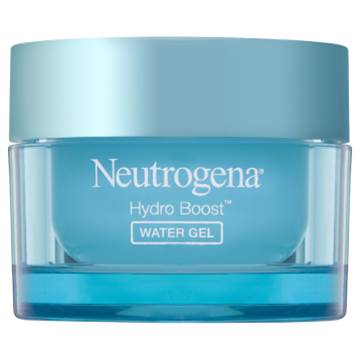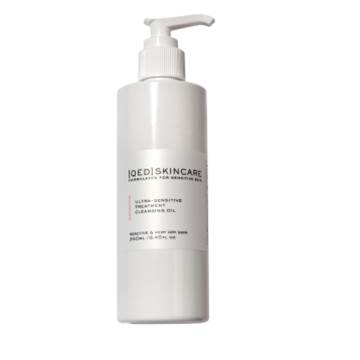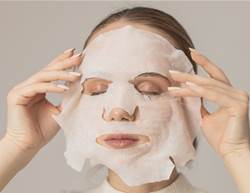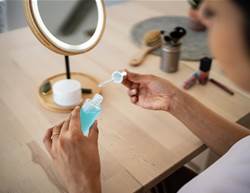1. Look for pH-balanced skincare
The surface of your skin is usually a slightly acidic pH 5.5 (pH 7 is neutral), which helps protect it from bacteria. Messing with the pH balance of sensitive skin is asking for trouble. Products that lower the pH dramatically (such as a serum or toner with a strong alpha hydroxy acid), or raise the pH (such as soap), can cause skin to sting, breakout, or become red as it tries to return to its optimum pH level again. Seek out products designed to maintain a healthy pH level (look for ‘pH balanced’ or ‘pH optimised’) to keep your skin’s surface as normalised as possible.
2. Go easy with skin conditions
Sensitivity can occur with immune conditions such as eczema and psoriasis, where the skin barrier and surface is impaired. Pharmaceutical-grade products, which you need a prescription for, have their place but can be harsh on the skin. On the other hand, cosmeceuticals, which can be purchased from skincare specialists, are packed with healing, active ingredients and are often a good bet – but the sheer variety on offer can be overwhelming. See a trusted skincare specialist, who can recommend products and even customise a regimen that’ll work for you.
3. Don’t over-cleanse
Your skin works hard to be healthy. Its protective outer layer – the lipid (fat) barrier – performs two main jobs: holding water in and keeping potentially damaging things, such as UV rays, wind, heat, and harsh chemicals, out. In people with sensitive skin, this barrier is typically weaker, thinner, and more susceptible to damage, making it easier for irritants to penetrate the skin and cause inflammation. This fatty layer can be stripped from the skin by over-exfoliating or by using harsh cleansers. Pay attention to your skin before and after exfoliating and stop if you notice any adverse reactions.
4. Avoid fragrances
One of the most irritating ingredients in skincare products is fragrance, including essential oils. So go fragrance-free with ingredients that retain moisture. Emollients (fats and oils) and humectants (such as glycerine and hyaluronic acid) and ceramides and fatty acids (which replenish the lipid barrier) are all sensitive-skin friendly. The idea is to create a protective layer. No matter how alluring a scented product is, put it down – your skin will thank you.
5. Take it slowly
Active ingredients, such as vitamins C and A and retinol, can wreak havoc with sensitive skin if used without caution. But this doesn’t mean ditching them altogether. Use a new product gradually to build up skin tolerance. Select a lower concentration of the active ingredient, use a small amount, and only apply it every two or three days at most. As your tolerance grows over time, you can gradually increase the frequency of application. Want to take things further? A consultation with a professional dermatologist or dermal therapist can not only diagnose any skin issues but can also help you find products that result in happy, healthy, hydrated skin.
Try these expert-chosen products for sensitive skin - winners of the Prevention Best of Beauty Awards 2021
1. Neutrogena Hydro Boost Water Gel, RRP $26.99

This affordable moisturiser has hyaluronic acid and antioxidants for long-lasting hydration that keeps skin supple all day, plus the cooling gel is a pleasure to apply. “The oil-free, hypoallergenic and hydrating ingredients are suitable for people with acne- and rosacea-prone skin,” says Dr Yiasemides.
2. QED Skincare Ultra-Sensitive Treatment Cleansing Oil, RRP $60

This gentle cleansing oil doesn’t require water, since jojoba, sunflower and non-palm vegetable oils do all the work – just swipe off with a cotton pad. “Perfect for all skin types, it does an excellent job of removing make-up and leaves skin feeling hydrated,” says make-up artist Amanda Ramsay.






.jpg&h=193&w=250&c=1&s=1)



